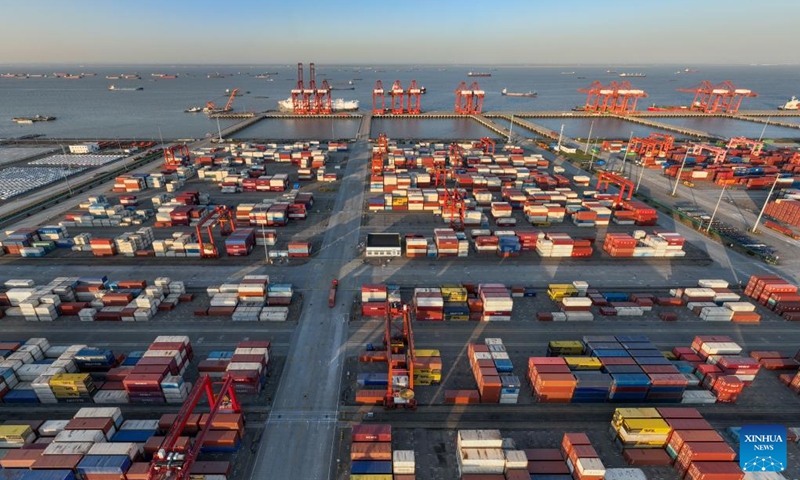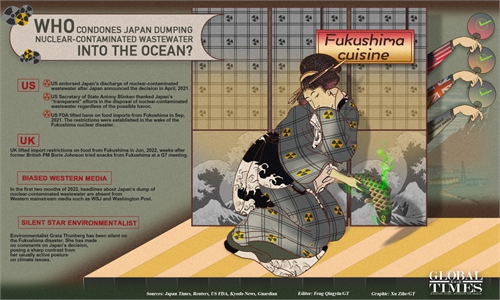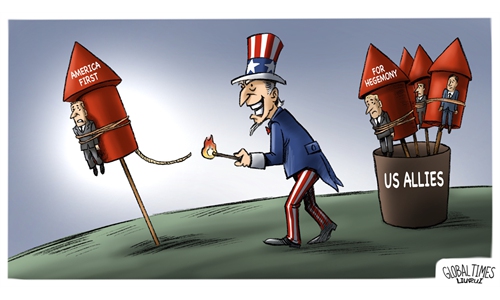Germany, Japan agree to forge closer ties; nations warned not to fall into US’ ‘decoupling China’ trap: analyst

This aerial photo taken on March 13, 2023 shows a container terminal of Taicang Port, east China's Jiangsu Province. Taicang Port in Jiangsu has operated orderly and efficiently. The port saw its foreign trade cargo throughput reach 17.63 million tonnes while the foreign trade container throughput hit 775,000 twenty-foot equivalent units (TEUs) over the first two months this year. (Photo:Xinhua)
China and Japan have agreed to strengthen cooperation in minerals, semiconductors, batteries and other "strategic areas" on Saturday, a move aiming to "better cope with China's growing influence and global security concerns," according to a report from the Associated Press (AP) on Saturday.
Coming as the US' intensified pressure on its allies to join the so-called "anti-China alliance", industry observers said the move indicates the two nations are balancing a "tough stance" amid tensions between the world's two largest economies, while seeking a stable supply chain since uncertainties are rising.
However, observers also noted that a full "decoupling" from China is unlikely and in practical terms impossible, given the two's intertwined trade ties with China and their vast interests in the Chinese market.
"Decoupling" from China would serve only the interests of America and damage their own industries, they warned.
According to the AP report, the agreement was made during the first round of government consultations between Germany and Japan held in Tokyo on Saturday, attended by German Chancellor Olaf Scholz and Japanese Prime Minister Fumio Kishida.
Kishida told a joint press conference after the talks that the move was made in order to "counter economic coercion, state-led attempts to illegally acquire technology and non-market practices," which "apparently referring to China," AP said.
"Due to an evolving global market, no matter in semiconductor, raw materials or other areas, Germany and Japan are adapting to changes, and in some sectors, trying to restructure supply chains in an effort to ensure safety," Cui Hongjian, director of the Department of European Studies at the China Institute of International Studies, told the Global Times on Sunday.
However, Cui noted that a full economic "decoupling" from China - which will greatly impact on the two nations' economies - was impossible despite the US' intensified pressure.
German leaders have said they are against "decoupling" in any form on many occasions.
China remained Germany's largest trading partner for the seventh year in a row in 2022, according to a report from the Xinhua News Agency, citing the country's Federal Statistical Office (Destatis).
Chinese goods imported by Germany in 2022 increased by 33.6 percent year-on-year to 191.1 billion euros ($204.4 billion), according to Destatis. At the same time, German exports to China rose by 3.1 percent to 106.8 billion euros.
Japan has also seen booming trade with neighboring China. China, Japan and 14 other Asia-Pacific countries signed the world's largest free trade agreement in November 2020. The signing cemented the Regional Comprehensive Economic Partnership (RCEP) as the largest trading bloc globally, covering a market of 2.2 billion people and $26.2 trillion of global output.
Chinese Foreign Minister Qin Gang said at a press conference on March 7 that Beijing hopes for "friendship and good neighborliness" with Japan, but warned Tokyo not to take part in a "new Cold War" led by Washington.
The press conference was held during the first session of the 14th National Press Conference and it is also Qin's first appearance at the two sessions since he took office three months ago.
If some people in Japan do not want to be partners with their neighbors but want to be engaged into new Cold War to contain China, there will be new wounds to China-Japan relations, Qin said.


